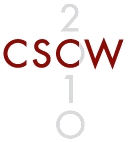altmetrics11: Tracking scholarly impact on the Social Web
February 24th, 2011 by darioKoblenz (Germany), 14-15 June 2011
An ACM Web Science Conference 2011 Workshop
“Evaluating online evidence of research impact”
Call for papers
The increasing quantity and velocity of scientific output is presenting scholars with a deluge of data. There is growing concern that scholarly output may be swamping traditional mechanisms for both pre-publication filtering (e.g peer review) and post-publication impact filtering (e.g. the Journal Impact Factor).
Increasing scholarly use of Web2.0 tools like CiteULike, Mendeley, Twitter, and blog-style article commenting presents an opportunity to create new filters. Metrics based on a diverse set of social sources could yield broader, richer, and more timely assessments of current and potential scholarly impact. Realizing this, many authors have begun to call for investigation of these “altmetrics.” (see altmetrics.org)

 The confluence of two major trends in scientific research is leading to an upheaval in standard scientific practice and collaborative technologies. A new generation of scientists, working in large-scale collaborations, is repurposing social software for use in collaborative science. Existing social tools such as chat, IM, and FriendFind are being adopted and modified for use as group problem-solving facilities. At the same time, exponentially greater and more complex datasets are being generated at a rate that is challenging the limits of current hardware, software, and human cognitive capability. A concerted effort to create software that will support new scientific practices and handle this data tsunami is redefining the collaboratory and represents a new frontier for computer supported cooperative work.
The confluence of two major trends in scientific research is leading to an upheaval in standard scientific practice and collaborative technologies. A new generation of scientists, working in large-scale collaborations, is repurposing social software for use in collaborative science. Existing social tools such as chat, IM, and FriendFind are being adopted and modified for use as group problem-solving facilities. At the same time, exponentially greater and more complex datasets are being generated at a rate that is challenging the limits of current hardware, software, and human cognitive capability. A concerted effort to create software that will support new scientific practices and handle this data tsunami is redefining the collaboratory and represents a new frontier for computer supported cooperative work. Learning technologies have been taking an increasing role in almost all learning environments. They are used in a variety of informal and formal educational environments, from early years to university level and throughout adulthood, as well as in many commercial, industrial, and governmental settings. With the greater use of learning technologies it is critical to better understand how they interact with human cognition. Both in terms of how they may facilitate and enhance (as well as hinder) learning, and also in terms of how they affect the way we learn and acquire information, and the nature of cognition.
Learning technologies have been taking an increasing role in almost all learning environments. They are used in a variety of informal and formal educational environments, from early years to university level and throughout adulthood, as well as in many commercial, industrial, and governmental settings. With the greater use of learning technologies it is critical to better understand how they interact with human cognition. Both in terms of how they may facilitate and enhance (as well as hinder) learning, and also in terms of how they affect the way we learn and acquire information, and the nature of cognition.